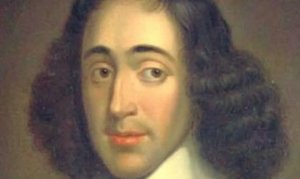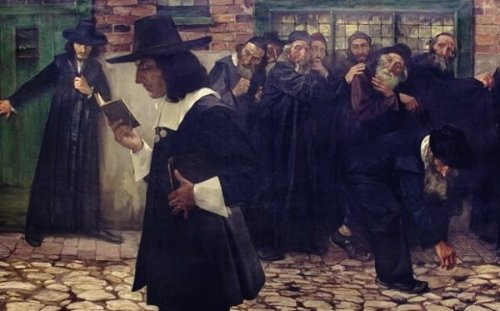Five Timeless Baruch Spinoza Quotes

Most Baruch Spinoza quotes are both simple and deep at the same time. Many philosophers, such as Hegel and Schelling, held him in high regard. In fact, when compared with most philosophers of such complex prose, Spinoza’s assertions are quite clear and understandable.
Baruch Spinoza was born in Amsterdam in the year 1632. His Jewish family was persecuted for generations. They were exiled from Spain, Portugal, and France. In the Netherlands, they finally were able to settle down and live in peace. Perhaps this explains why religion is such a recurring theme in Spinoza’s work.
This philosopher didn’t propagate religious beliefs but questioned them. As a result, he was expelled from Judaism and several of his works were banned. His friends published a lot of the material he’d written after his death.
Many of Spinoza’s quotes have an impressive timeless quality that many still admire. Here are a few of them.
1. Baruch Spinoza on Regret
“I don’t regret anything. He who regrets what he’s done is doubly miserable.”
By the seventeenth century, this phrase was completely revolutionary: many of his contemporaries would describe it as profane and offensive.
Recall that one of the basic pillars of Christianity is repentance, which is basically a religious form of regret. Our era is, for the most part, secular, but in Baruch Spinoza’s time, people considered it blasphemous to be proud of one’s non-repentance. Today, these words mainly invite us to reflect. Think about it. How much resentment and guilt do you carry around?

2. Differences in Thought
Spinoza was a freethinker ahead of his time. He didn’t have dogmas, nor prejudices, nor unfounded beliefs. His liberal spirit and analytical mind gave him ideas that were deeply critical of the world and his environment.
“There is as much difference between the heads as there is between the palates.”
This small statement in favor of the diversity of thought wasn’t really accepted among his contemporaries. At that time, only truths without exceptions and unique and powerful reasons were well-received.
3. Baruch Spinoza on Freedom
Baruch Spinoza affirmed the following:
“The most important achievement that a human being can attain is to learn to understand because to understand is to be free.”
This Dutch philosopher is still one of the greatest rationalists of all time. In the above quote, freedom has transcendental value. Likewise, it’s asserted that freedom is born of reason, of understanding. This is opposite to the prevailing culture of that time, since speaking of freedom made you a suspect and dismissing religion was considered an act of madness.

4. Desire and Goodness
This thinker set a before and after, especially in the field of ethics. His quotes appear in Freud, Lacan or Foucault’s work. And his work set the bar in the Western world and so much of what’s postulated today is rooted in the philosophical analysis of this Dutch philosopher.
Another of his quotes states: “We do not want something because it’s good. On the contrary, we say that something is good because we want it.”
What an acute appreciation of human nature! Here, the philosopher talked about the subjective distortion that stems from personal inclinations.

5. God and Ignorance
If Baruch Spinoza’s work was forbidden and hidden for almost a century, it’s because he explored the subject of God with an entirely renewed vision that wasn’t welcomed by the most powerful and dogmatic circles of his time. He managed to make a distinction between religion and reason, which was frowned upon by those who exercised religious power.
One of Spinoza’s quotes states: “Those who, while ignoring something, resort to the will of God, are completely deluded: a ridiculous way, no doubt, to confess their own ignorance.”
Even though he was a deeply religious man, in that quote he talked about the existence of other forces, many of them under our control, with which we can shape our future.
Baruch Spinoza had to face the many ideological pressures of his time. Even so, he never stopped being a freethinker and analyzing everything with his independent mind.
He died of tuberculosis at the age of 44. At the time of his death, he only possessed two beds, two tables, polishing equipment, and 150 books.
All cited sources were thoroughly reviewed by our team to ensure their quality, reliability, currency, and validity. The bibliography of this article was considered reliable and of academic or scientific accuracy.
Damasio, A. R. (2005). En busca de Spinoza: neurobiología de la emoción y los sentimientos. Grupo Planeta (GBS).
This text is provided for informational purposes only and does not replace consultation with a professional. If in doubt, consult your specialist.








